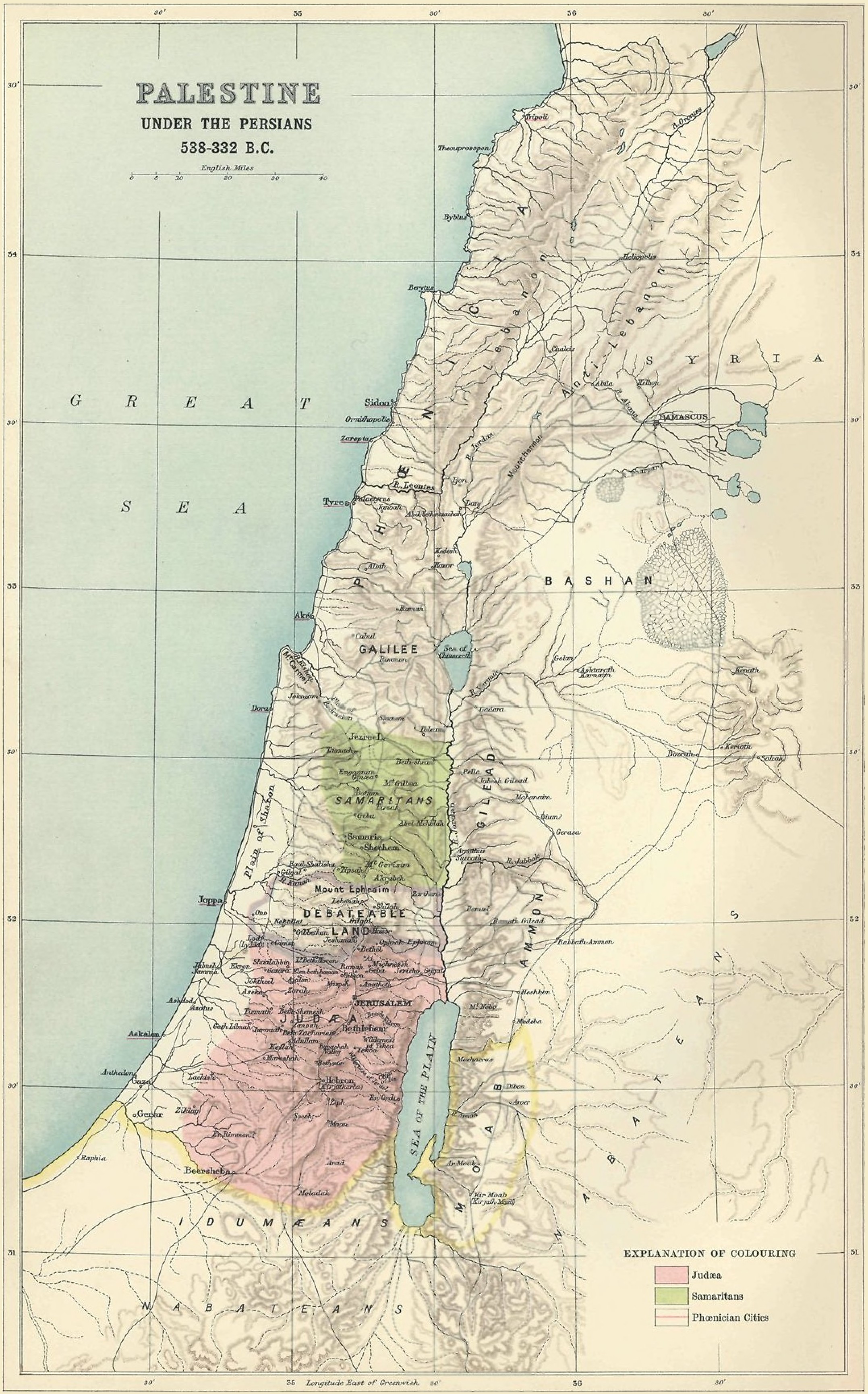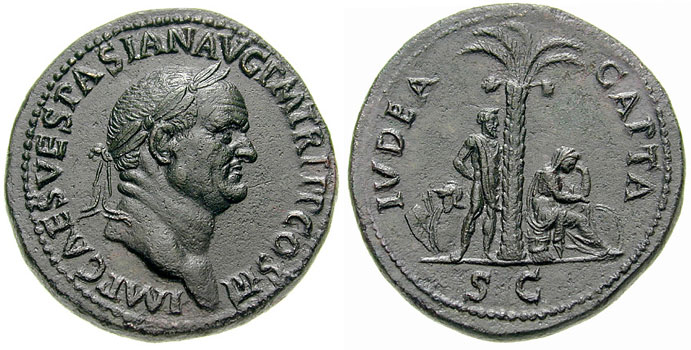Herodotus
The first time the name Palestine was used to describe the entire region was in 450 BCE by the ancient Greek historian Herodotus. He lived in the 5th century BCE and is best known for his monumental work "Histories", which provides an account of historical events, cultures, and geography known to the Greeks at the time. Herodotus' accounts are not always considered entirely accurate by modern standards, yet he had a great influence on shaping how history and geography was perceived by scholars who read and relied on his books.
In his 3rd book, chapter 91, he describes the fifth district (satrapy) of the Persian Achaemenid Empire, a maritime province (also known as Abar-Nahara in other sources):
“Φοινίκη τε πᾶσα καὶ Συρίη ἡ Παλαιστίνη καλεομένη καὶ Κύπρος: νομὸς πέμπτος οὗτος”
“The whole Phoenicia and the part of Syria which is called Palaistine and Cyprus: this is the fifth division”
He recounts Cyprus and Phoenicia who were known powers in the region at that time. However, Herodotus claims the same distinction for Palaistine-Syria, the name he gives for the area between Phoenicia (modern day Lebanon) and Egypt.
 Phoenicia & Egypt c. 550 BCE
Phoenicia & Egypt c. 550 BCE
At the time of Herodotus, the area he describes as Palaistine and was part of the Persian Achaemenid Empire consisted of Yehud Medinata, an autonomous Jewish administrative province in Judea, inhabited by several tens of thousands to hundreds of thousands of Jews. The province of Samaria, inhabited by tens of thousands of Samaritans, and a Phoenician province along the coastline, consisting of cities like Ashkelon and Ashdod.
 The area under the Persian Achaemenid Empire
The area under the Persian Achaemenid Empire
Why Palaistine?
Why did he choose to use Palaistine instead of Judea or Israel, names which most locals were likely to call themselves?
One hypothesis is that he travelled only the coastal areas, and was told the name of the former residents of the southern coast, the Philistines. The Philistines were part of Southern European (Aegean) groups who invaded the Middle East during the Late Bronze Age collapse (c. 1175 BCE). But Philistia was destroyed 154 years earlier in 604 BCE by Nebuchadnezzar II, the king of Babylon. He conquered the Philistines cities, destroyed them and exiled many of their residents, after which the surviving Philistines lost their distinct ethnic identity and disappeared as a people from the historical and archaeological record, assimilating in the local Canaanite-Israelite population.
Another hypothesis is that Herodotus chose to translate the name “Israel” to Greek instead of transliterating it. It was first noticed by the German Bible scholar Martin Noth in 1939 and later developed and expanded by the British archeologist David Michael Jacobson in 1999.
The biblical text explains the meaning of Israel in Genesis, chapter 32. Verse 24:
“וַיִּוָּתֵ֥ר יַֽעֲקֹ֖ב לְבַדּ֑וֹ וַיֵּֽאָבֵ֥ק אִישׁ֙ עִמּ֔וֹ עַ֖ד עֲל֥וֹת הַשָּֽׁחַר”
“Then Jacob was left alone; and a Man wrestled with him until the breaking of day”
And verse 28:
“וַיֹּ֗אמֶר לֹ֤א יַֽעֲקֹב֙ יֵֽאָמֵ֥ר עוֹד֙ שִׁמְךָ֔ כִּ֖י אִם־יִשְׂרָאֵ֑ל כִּֽי־שָׂרִ֧יתָ עִם־אֱלֹהִ֛ים וְעִם־אֲנָשִׁ֖ים וַתּוּכָֽל”
“And He said, Your name shall no longer be called Jacob, but Israel; for you have struggled with God and with men, and have prevailed”
Israel = wrestler with God. In Greek the word for wrestler is παλαιστής (palaistês). Adding the Greek suffix -inos or -ine, meaning “of or pertaining to,” “of the nature of,” “made of,” “like”, and we get Palaistine.
According to Jacobson, “In Greek eyes, the people of Israel were descendants of an eponymous hero who was a god wrestler”. The Greeks, renowned for their admiration of epic tales and their invention of and passion for wrestling, would have been intrigued by the Biblical explanation of the name Israel, as transmitted to them by the Jews.
More support to this hypothesis comes from the 2nd century BCE Greek translation of the Hebrew Bible - the Septuagint. It uses the Greek verb παλαίω (palaio) or παλαίειν (palaiein), to wrestle, in the translation of verses 24 & 25.
On the other hand, when describing the Philistines, the Septuagint translators didn’t use the word Palaistine that was known to them from Herodotus; instead, to describe the people, they used the word Φυλιστιεὶμ (Philistieim), transliterated from Hebrew Pelishtim (Septuagint Genesis 26:1, 14, 15, 18; Exodus 23:31, Joshua 13:2–3), and used γῆν τῶν Φυλιστιείμ (Gên ton Philistieim) literally the land of the Philistines, called Pleshet in Hebrew (Septuagint Genesis 21:32, 34; Exodus 13:17.).
In other instances where the Philistines are mentioned by name in the Hebrew bible, they used the word ἀλλόφυλοι (allophyloi) which translates to strangers or other nations (Septuagint 1 Samuel 31:1).
Palaistinê must have therefore signified something else.
Further evidence supporting this hypothesis arises when examining how Herodotus describes the residents of Syria-Palaistine, which bears a striking resemblance to the Israelites/Jews. He references the population of Palaistinê as being circumcised (book 2 chapter 104). However, the Philistines, as we know from the Bible, were uncircumcised unlike the Israelites. There is no evidence that dates earlier than the 2nd century CE for any ethnic group in the region other than the Hebrews practicing circumcision.
Since Herodotus’ “Histories” was published the name Palaistine was used for the land occasionally, mainly in Greece, but the dominant name was still Judaea.
Ancient writers
In 2 CE, The poet Ovid writes in his book Art of Love Book I, originally written in Latin:
Line 76:
“Cultaque Iudaeo septima sacra Syro”
“The sacred seventh day rites of the Syrian Jews”
Line 416:
“Culta Palaestino septima festa Syro”
“The seventh day feast rite of the Syrians Palaestinians”
It's most likely he talks about the Jewish Sabbath observances in both occurrences, using the words for Jews and Palaestinians interchangeably.
In 40 CE, Philo of Alexandria writes in his book Every Good Man is Free:
“Moreover Palestine and Syria too are not barren of exemplary wisdom and virtue, which countries no slight portion of that most populous nation of the Jews inhabits. There is a portion of those people called Essenes…”
According to Philo Jews were the inhabitants of Palestine.
The Roman Empire
In 63 BCE, almost 400 years after Herodotus, the Roman Empire deposed the ruling Hasmonean dynasty of Judaea and the Roman Senate declared Herod the Great "King of the Jews" in c. 40 BCE. The Romans called the land “Roman province of Iudaea”, and after destroying the temple they issued “Judea Capta” (Judaea conquered) commemorative coins.
 'Judea Capta' sestertius of Vespasian, struck in 71 AD to celebrate the victory in the Jewish Revolt. The inscription on the reverse says: IVDAEA CAPTA, "Judaea conquered".
'Judea Capta' sestertius of Vespasian, struck in 71 AD to celebrate the victory in the Jewish Revolt. The inscription on the reverse says: IVDAEA CAPTA, "Judaea conquered".
Many of the Jewish residents of Jerusalem died during the siege and the ensuing battle. According to the Roman–Jewish historian Josephus Flavius, about 97,000 Jewish captives from Judea were sold into slavery by the Romans, many brought to Rome. He added that 30,000 Jews were deported from Judea to Carthage by the Romans.
While destroying the Jewish temple the Romans also plundered it, The Arch of Titus in Rome depicts the triumphal procession celebrated in 71 CE after the Roman victory, showing the menorah and other objects looted from the Temple of Jerusalem carried to Rome.
After the Jewish-Roman wars (66–135), and more specifically after suppressing the Bar Kokhba Revolt, Hadrian changed the name of Iudaea province to Syria Palaestina. Jacobson suggests, his “choice of Syria Palaestina may be more correctly seen as a rationalization of the name of the new province, in accordance with its area being far larger than geographical Judea.”.
However, Hadrian was actively attempting to erase the historical ties of the Jewish people to the region, an act the Romans called "Damnatio memoriae" the erasure of a person – in this instance a country – from historical memory as a punishment and an insult. For example, by renaming Jerusalem to Ælia Capitolina, Shechem to Neapolis (the city is called Nablus by the Arabs to this day), building a temple for Jupiter on the temple mount and prohibiting access of Jews to Jerusalem punished by death. Therefore, the renaming of Judea to Palaestine is commonly viewed today as serving his purpose of erasing the land's Jewish identity, but it might not have been his main reason.
From the Romans to the present day
From 135 and until 1948, even though Jews continued to live in the area and the name Judea was known, the name Palestine became the dominant name for the land and the residents were referred to as Palestinians. The Jewish residents accepted this name, though it was not a name they generally used for themselves. The Arab residents on the other hand adamantly insisted that only Jews were Palestinians, and Arabs were either just Arabs, or Syrians. The reason for that is because Palestine was the name used for the place by Westerners, starting with Herodotus, the Romans and so on through to the British. The Arabs of the region mostly thought of Palestine as southern Syria, or more broadly as Bilad al-Sham (=The lands of the north, as named by the Arabians who lived south of the region before the Arab Conquest and colonization of the Middle East), and themselves as simply Arabs. Before the 1967 war, the Arabs of the West Bank thought of themselves as Jordanian and the Arabs in Gaza thought of themselves as Egyptian.
In 1948, when the State of Israel achieved independence, the Jewish people discarded the name “Palestine”, and restored one of the ancient native names for the land - Israel.
The Arab Palestinian identity was formed in the first Arab League summit in 1964, when the Arabs declared themselves to be “Palestinians”. The term was unused and allowed them to claim it exclusively for themselves, in the hope that people would forget when and how they adopted the name, and would associate Arabs with the land’s history.
As Yasser Arafat, a prominent Palestinian leader and founding father of the Palestine Liberation Organization, told the Italian journalist, Oriana Fallaci, in an interview in 1970:
“The question of borders doesn’t interest us. Palestine is nothing but a drop in an enormous ocean. Our nation is the Arabic nation. The PLO is fighting Israel in the name of Pan-Arabism. What you call Jordan is nothing more than Palestine.”
Admitting Palestine is also Jordan, though no “Free Palestine” is demanded there, and admitting the Palestinian cause has nothing to do with self determination of a unique indigenous people, but with the Arab-Muslim principle that once a territory becomes part of the "Dar al-Islam", it should remain under Islamic rule forever.